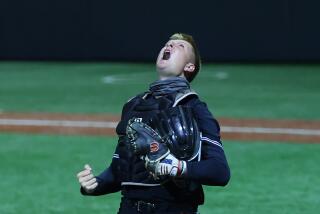He’ll Do His Hitting on a Different Field : College football: Freshman cornerback Roques played two years in Padre system before donning pads at UCLA.
- Share via
The first pitch was inside, hitting him on the left arm.
“A 91-m.p.h. fastball,” said Aaron Roques. “You know those rookie pitchers.”
On base after being hit, Roques got the steal sign and took off. “I slid head first into second base, on my side, trying to protect my left arm that had been hit,” he said.
Rolling his body, he jammed his right shoulder, and with injuries on consecutive pitches, playing defensive back at UCLA started to look better. Professional baseball in a San Diego Padre rookie camp in Arizona began to pale.
Roques had been recruited by the Bruins, Oregon and others as a wide receiver and defensive back at Canyon Springs High in Moreno Valley, where he also hit .300 as a senior outfielder.
“Somebody told me I couldn’t play both sports at UCLA, and I understand, at Oregon too,” he said. “So I signed with (Nevada) Reno to play both.”
Then he signed with the Padres as a 13th-round draft choice.
“That pretty well took care of football for me,” Roques said.
Until the 91-m.p.h. fastball and the terrible slide at second in extended spring training in Arizona. Inside pitches became terrifying. “I began to bail out,” he said. “I probably hit .100-something while trying to recover.”
He never did and was released in January. The next move was to a telephone.
“I went to California for a visit, because a guy I had played with in high school, Eric Zomalt (a defensive back who graduated this year), was there,” said Roques. “But I didn’t particularly like it.
“(Former assistant) Jacob Burney had recruited me for UCLA out of high school, but he wasn’t there, so I called Coach (Ed) Kezirian.”
Kezirian, UCLA’s academic liaison, referred the matter to Bill Rees, then the recruiting coordinator and now the West Coast scout for the Kansas City Chiefs. He went into the archives for film on Roques and liked what he saw.
So did the UCLA coaching staff.
“We had a scholarship to offer, so we talked to him to see if he had the desire and commitment to play football again,” said A.J. Christoff, who coaches UCLA’s defensive backs. “He had been away from football for a while.”
That he was a candidate for a position UCLA desperately needed to fill was a point in his favor.
“I just had to get the paperwork on my release so I could get my scholarship, and that let me enroll for the spring quarter,” Roques said.
It also allowed him to participate in spring practice and get a leg up on other first-year players. Summer workouts with Bruin alumni, who come back to stay in shape, helped bring Roques back from football inactivity. Exposure to Carlton Gray, a UCLA All-American defensive back who plays with the Seattle Seahawks, and Mike Sherrard, a wide receiver with the New York Giants, will do that.
Roques is listed No. 2 on the depth chart at cornerback, behind the Bruins’ best defender, Carl Greenwood, and is being counted on to help as part of five- and six-back defenses in pass situations.
In a week, he will be a 20-year-old freshman.
“That actually helps,” he said, laughing. “But I can’t redshirt. I don’t think I could handle being a 25-year-old senior. A 24-year-old senior is bad enough.”
He says maturity gained in two baseball seasons is valuable.
“I don’t think I was really ready for college football right out of high school,” Roques said. “I was away from home, playing baseball, and that helped me learn to do things for myself and mature.
“Also, it helped me not to be so in awe of what I’m seeing here.”
He saw the first day of fall practice on Saturday, particularly noticing other freshmen defensive backs. They are 18-year-olds who were in high school only two months ago. Now, they are learning to play pass defense against All-American J.J. Stokes.
“You can see it in their eyes,” said Roques. “It can be overwhelming.”
Two-a-day practices in August are wearing, too, as he is learning.
“It’s more intense,” Roques said. “In baseball, practices could be longer, but there wasn’t constant activity. But I’m handling this and I like it.”
More to Read
Go beyond the scoreboard
Get the latest on L.A.'s teams in the daily Sports Report newsletter.
You may occasionally receive promotional content from the Los Angeles Times.






